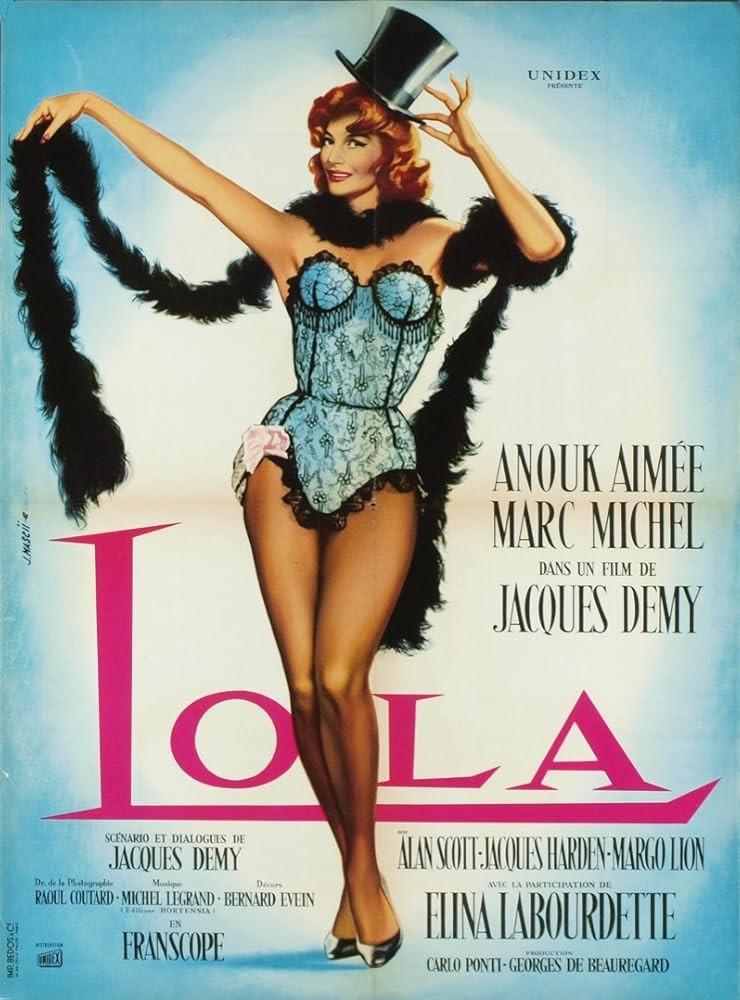
LOLA
(director/writer: Jacques Demy; cinematographer: Raoul Coutard; editor: Anne-Marie Cotret ; music: Michel Legrand; cast: Anouk Aimée (Lola), Marc Michel (Roland Cassard), Jacques Harden (Michel), Alan Scott (Frankie), Margo Lion (Jeanne), Catherine Lutz (Claire), Elina Labourdette (Mme. Desnoyers), Annie Duperoux (Cecile), Gerard Delaroche (Yvon); Runtime: 90; MPAA Rating: NR; producer: Carlos Ponti; Unidex; 1961-France/Italy-in French with English subtitles)
“Pleasantly conceived romantic roundelay.“
Reviewed by Dennis Schwartz
Jacques Demy’s auspicious debut as director. The story is set in the busy port city of Nantes, his hometown. The romantic drama bombed when first released and it wasn’t until after his third film in 1964, a continuation of the Lola story, The Umbrellas of Cherbourg, that he gained recognition at least in his own country. International fame came many years later. In Lola, Demy paid homage to Max Ophüls and confessed in interviews that when he made Lola he was thinking of Ophüls’ Le Plaisir (1952). It also pays tribute to the joyous spirit of American musicals though it never becomes a musical except in intention, Marlene Dietrich’s Lola in Josef von Sternberg’s The Blue Angel (1930), and probably a large bit to the sexy Marilyn Monroe persona. Anouk Aimée stars as the alluring and guileless Lola, the mysterious woman of the world who draws the attention of a trio of lovers, in her universal portrayal of a vulnerable cabaret singer jilted in love but still hopeful of her man returning. She’s the dutiful mother of a seven-year-old boy named Yvon (Delaroche), fathered by hometown boy Michel (Jacques Harden) who ran out on her seven years ago when she was pregnant. Lola, whose real name is Cecile, is typecast as the good-hearted whore who sells her body but not her soul.
The opening sequence shows a mysterious man getting into a white Caddy convertible and speeding along the harbor section of Nantes and nearly running over a group of playful American sailors on shore leave heading for the dancing girls at the cabaret. We’ll learn later that the driver is Michel, who left town for adventure and to become rich. After duty as a sailor, he traveled around the world and his luck changed as he became fabulously wealthy. He has now returned after seven years of no contact with the girl he loves, to ask her to marry him.
The handsome, well-read, and courteous Roland has returned broke to his hometown after 15 years of drifting all over the world and taking a number of dead-end jobs. He has been home for three days and is a boarder in plain-speaking Claire’s restaurant/bar, where she thinks he’s a loafer but cares greatly about his well-being and cherishes their long friendship. One of the restaurant patrons is the mother of Michel, Jeanne (Lion), who paints bad art at the bar because she’s bored. She’s ridiculed for dreaming her son has returned, as she then has to defend him to Claire as an honest and wonderful son despite no contact with him since he left.
The bored Roland has been fired from a dull minor job for being late the three days he was employed. While stopping off in a bookstore he meets an older, charming bourgeois widow Mme. Desnoyers (Elina Labourdette) and her pop-culture influenced 14-year old daughter Cecile (Annie Duperoux), and offers to deliver in their home his superior French-English dictionary that the bookstore would only have to order. Taken with the coincidence that the only girl he loved a number of years ago was also 14 and named Cecile, he welcomes this contact. But the lonely Mme. Desnoyers is attracted to the cultivated and mannerly nice man, and dreams of a relationship. Her life came to a halt when her husband was killed during the war and she lost most of her income.
Back in Claire’s restaurant, the friendly busybody steers Roland to a beauty salon about a possible job she overheard about while getting a haircut. It turns out it’s a shady job as a courier smuggling diamonds in South Africa. The desperate Roland decides to take the risky job despite his doubts, and is scheduled to leave in a few days by boat. While on the street to give the dictionary to Cecile, he bumps into Lola and her son, and after 15 years of not seeing each other they are glad to get reacquainted.
Lola performs at midnight in the cabaret and afterwards goes to bed with an American sailor, Frankie (Alan Scott). He’s an admirer finishing his tour of duty and is returning shortly to Chicago and his fiancee, who has been generous with his money and has treated her with respect. But most of all Frankie reminds Lola of the only man she loves–Michel.
In this pleasantly conceived romantic roundelay, there’s real pain in both love and loneliness. When Roland learns that the only girl he ever loved doesn’t love him and thinks of him only as a friend, he leaves on the boat despite his beauty salon boss being arrested in a police raid. That Lola and Michel are the only ones in this film who happily get together, makes the film even more meaningful as to the lingering effects of first love. Though the story seems superficial, it somehow manages to tap deeper into matters of love than I first thought. Cinematographer Raoul Coutard shoots this beautiful CinemaScope black-and-white film, which is accompanied with a wonderfully light musical score by Michel Legrand. It continues to be an underrated film that has slid through the cracks and deserves far greater critical recognition and public reception than so far received.
REVIEWED ON 12/14/2003 GRADE: A